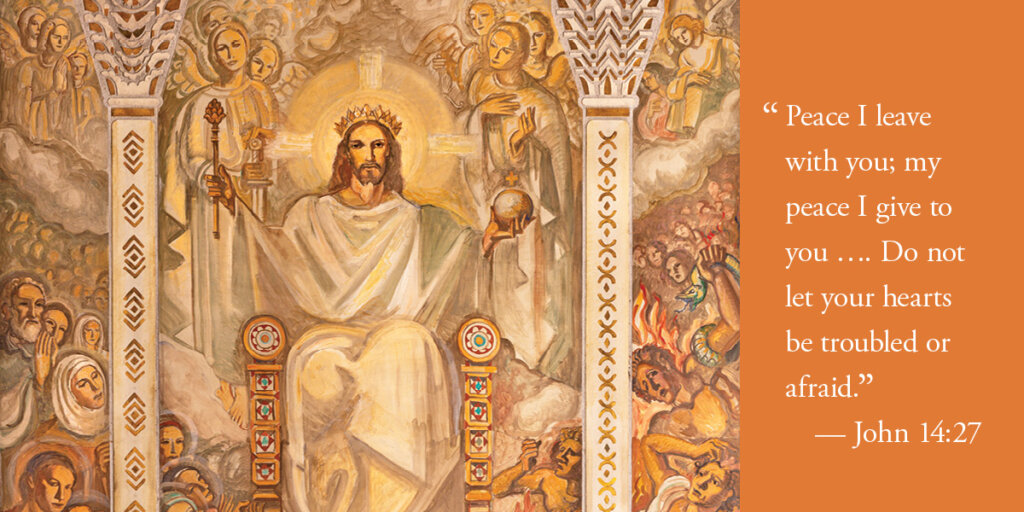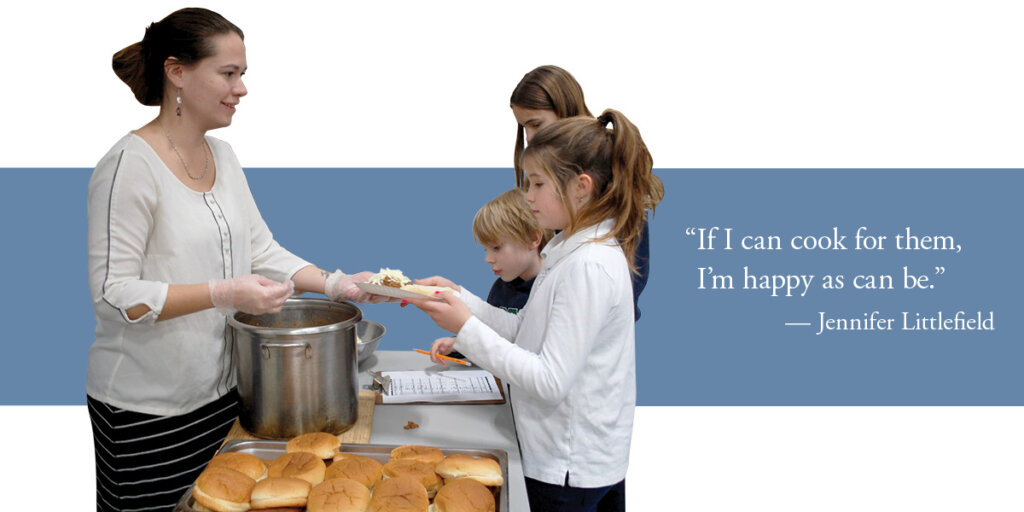Pastoral Letter from Bishop Coyne re: Creating a Culture of Life
Dear Brothers and Sisters in Christ,
I write this letter to you today as your brother and your bishop. I write not as a politician but as a pastor, seeking to offer guidance to you, the faithful, in light of the two significant challenges that have existed in our state for many years, even prior to the recent decision of the United States Supreme Court overturning Roe vs. Wade.
The immediate challenge we face is the continuing efforts to enact state laws and policies that incentivize and encourage the right to an abortion as the first response to an unplanned pregnancy, culminating in the drive to amend the Vermont State Constitution this November enshrining these laws within the state constitution. The larger, more complex challenge to address is a culture that no longer prioritizes the support of families and children, especially the poor and the single parent so as to lessen the factors that lead to an abortion. Allow me to address the immediate challenge first.
The U.S. Supreme Court ruling overturning Roe vs. Wade has no effect on the present legal right to abortion in the State of Vermont. Our state already has the most liberal of laws allowing for abortion on demand right up to the moment of birth. Efforts to amend the state constitution this November under Article 22 will enshrine these laws within the state constitution.
On Feb. 8, the Vermont House of Representatives passed Proposal 5, placing a referendum on the Nov. 8 election ballot. Known as Article 22, the “Reproductive Liberty Amendment” reads, “That an individual’s right to personal reproductive autonomy is central to the liberty and dignity to determine one’s own life course and shall not be denied or infringed unless justified by a compelling State interest achieved by the least restrictive means.”
There are many problematic implications of this proposed addition to Vermont’s constitution. The most problematic, however, may be the explicit intent of our state’s lawmakers by this amendment to create the strongest legal precedent for keeping abortion on demand for any stage of pregnancy, even late-term pregnancies, for any reason.
I ask you to consider with great seriousness the implications of this amendment. Our state constitution not only serves as the foundation for the enactment of our state laws and interpretation of those laws within our judicial system, it also serves to enshrine the values that we should hold as a people of the State of Vermont. Do we really want to enshrine amongst our values something as vague and misguided as a “right to personal reproductive freedom?” Should we not instead continue to value first and foremost the right to life of all human beings including the child in the womb? Should we not focus instead on the right to “life, liberty and the pursuit of happiness” by enacting laws and policies that directly confront the reasons why people choose to have an abortion by creating a “culture of life?”
Our Catholic faith guides us in challenging this amendment and the current abortion laws of our state. Pope St. John Paul II’s 1995 letter “Evangelium Vitae” (“The Gospel of Life”) directly confronts the act of abortion and is still inspiring and relevant today. The clear teaching of the pope was that an “abortion willed as an end or as a means, always constitutes a grave moral disorder, since it is the deliberate killing of an innocent human being. This doctrine is based upon the natural law and upon the written word of God, is transmitted by the Church’s tradition and [is] taught by the ordinary and universal Magisterium” (EV #62). At the same time, Pope St. John Paul II offers encouragement to all members of the Church that “together we may offer this world of ours new signs of hope and work to ensure that justice and solidarity will increase and that a new culture of human life will be affirmed for the building of an authentic civilization of truth and love” (EV #6).
This topic is of crucial concern for us in Vermont. On the one hand, the legal protection of life in the womb has been hindered by many practical and sociological factors. On the other hand, the ideal of such legal protection has always been an ideal for the Catholic Church. In this context, it is important that I recall for you the Catholic Church’s great history of moral and social teaching. Careful and prudent attention to this moral tradition and social teaching should be indispensable to our lives as Catholics in all aspects including and beyond the rights of children before birth, including and beyond the proper attitude toward children and family.
The great responsibility to live a life of faith and hope is then lived out in charity, our love for others as our brothers and sisters. Jesus told His disciples that the greatest commandments were expressly those of loving God and loving our neighbor. Charity calls us to be engaged in our duties as citizens, measuring and evaluating all potential laws and government policies in the light of our faith for the “common good” of every individual, family and community. The “common good” in Catholic social teaching assures us that the political order is not an inescapable conflict of mutually exclusive human rights. It is possible to support the life and dignity of all people through the right harmony of family, society, state and global community.
In this light, I state again that the intent to establish in the state constitution a legal endorsement of actions that are intrinsically evil — mainly that of electively procured abortion during all months of pregnancy — is directly opposed to the Church’s moral and social teaching and does not serve the “common good.” We ought to oppose this intent with the goal of creating a “culture of life” by forming true legal expressions of the dignity of human life, incorporating the affirmation of the praiseworthy commitments of parenting and of the rights and responsibilities of both children and parents.
Creating a compassionate culture of life is complex and requires an understanding of the underlying issues that lead someone to choose abortion. Often it is a choice made in desperation. Women experience higher rates of poverty than men in our country, and they are often the ones who sacrifice a career to raise children. Women make less money than men and lack sufficient maternity leave, affordable childcare and healthcare. Add to this the high cost of housing, inflation and lack of affordable higher education opportunities, and you can begin to understand the hopelessness some pregnant women face.
Great measures need to be taken to support families with both parental rights and responsibilities in Vermont. While it is certainly a priority to work for proper expressions of the right to life in future laws — even by supporting alternate proposals of constitutional amendments for our state — there are other actions that can and must be done here and now.
On March 25, 2020, the United States Conference of Catholic Bishops launched the “Walking with Moms in Need” initiative through the office of its Pro-Life Committee. The initiative supplied guidance and goals to prepare every Catholic parish to connect local pregnant and parenting women in need to every helpful resource. The launch date was chosen as a celebration of the 25th anniversary of St. John Paul II’s encyclical “Evangelium Vitae.” Now is the providential time for our pastors and parishes to move forward with “Walking with Moms in Need” programs. Our Catholic community in Vermont truly ought to be a network where a mother who had a need for her child or children who contacted anyone in the same Catholic community would quickly and certainly find the resources she needed.
A similar work of charity was accomplished by our Catholic parishes in 2021. The pandemic brought about many stresses concerning food insecurity. Our parish communities responded with direct offerings of food to the hungry or other indirect, tangible support for local food initiatives. Through the St. Joseph the Provider Project, all our churches are now a supporting force for resources for those who might go hungry.
We must also make new efforts to spread the message of Christ’s never-ending mercy to those women and men who are troubled in conscience from the experience of abortion. Project Rachel is an exceptional ministry for this purpose and has been promoted and encouraged in our parishes for many years. The resources of Project Rachel continue to be offered throughout our Diocese.
The St. Joseph the Provider Project and Project Rachel Ministries stand as just two examples of the charitable outreaches touching upon the right to life. They deserve more publicity and our constant support. The Walking with Mom’s Initiative is an occasion to establish this support.
In conclusion, I ask you to exercise your rights as a citizen of the State of Vermont and vote “No” on Article 22 this November. I also encourage you to work with your local legislators to enact policies and laws that support a “culture of life” that values not only life in the womb but life outside of the womb. I enjoin your prayers for the essential works of charity and for every opportunity to witness to the truth of the dignity of life. The praying of the rosary by individuals and groups of the faithful and times of Eucharistic Adoration in our parishes are most commendable for prayer in our parishes.
I am grateful for all those who contributed to the writing of this document, especially Father Timothy Naples, pastor of St. John Vianney Church in South Burlington. May all of our prayers bring those we serve, especially the vulnerable and most in need, to know the goodness of Christ, to the praise and glory of God the Father.
Yours in Christ,

The Most Reverend Christopher J. Coyne
Bishop of Burlington




